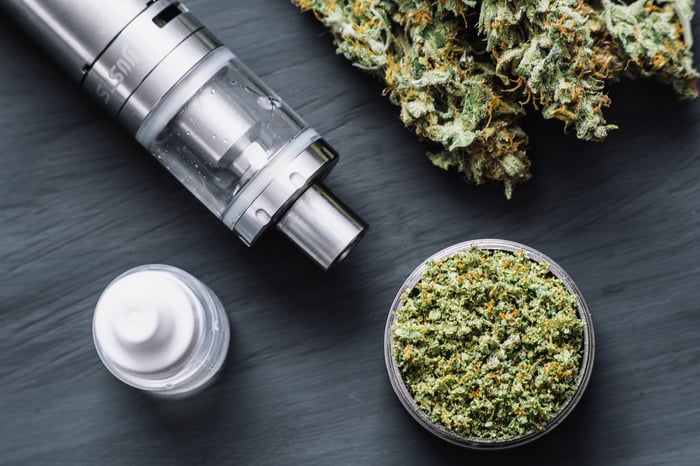For years, marijuana stocks were practically unstoppable, and a quick look at a combination of Wall Street and independent analyst forecasts for the industry shows why. With one Wall Street investment firm calling for as much as $200 billion in annual sales in a decade, and the duo of Arcview Market Research and BDS Analytics projecting a near-quadrupling in global sales by 2024 in their State of the Legal Cannabis Markets report, it hasn't been hard for investors to become enamored with pot stocks.
But of the dozens upon dozens of cannabis stocks to choose from, the trio of Canopy Growth (CGC -10.51%), Aurora Cannabis (ACB -4.85%), and Cronos Group (CRON -2.79%) rose to the top of the pack. What you might not realize about this trio is that, despite being absolutely throttled over the past seven months, they're delivered in a big way for investors over the past four years.
As you're about to see, if you had invested $1,000 into each of these three marijuana stocks over the trailing four-year period (beginning Oct. 23, 2015), you'd have made a lot of money.

Image source: Getty Images.
Canopy Growth: $12,794
You'll note that even with Canopy Growth having given up more than 60% of its gains from its peak, shares of the company have risen by close to 1,200% over the trailing four-year period. It's also still the largest pot stock in the world by market cap.
Working in Canopy's favor is the fact that it's the most cash-rich cannabis stock of them all. Following a 600 million Canadian dollars convertible debenture offering in June 2018, and a $4 billion equity investment from Modelo and Corona beer maker Constellation Brands in Nov. 2018, Canopy collected itself quite the war chest. It's been able to aggressively make acquisitions, expand its production capacity, and push into overseas markets, including the U.S. hemp industry.
But there are plenty of challenges that lie ahead for Canopy Growth. For one, the company doesn't have a permanent CEO steering the ship. Visionary co-CEO Bruce Linton was shown the door in early July after the company's quarterly losses ballooned. Meanwhile, current CEO Mark Zekulin, who previously served as co-CEO with Linton, will also be vacating his leading role once a permanent CEO replacement is found. This leaves Canopy's future very much in limbo.
Costs are also a worrisome topic for the company. Linton believed that issuing long-term-vesting stock was the best way to keep employees loyal to the company. Unfortunately, share-based compensation expensing has soared, right alongside general and marketing costs. It's looking as if Canopy could be one of the last pot stocks to generate a recurring profit.
As one added note, Canopy's goodwill has been growing in recent quarters as it adds to its assets via acquisitions. It's uncertain if the company will be able to recoup its CA$1.93 billion in goodwill, which could lead to a future writedown.
For now, long-term investors have done pretty well with Canopy Growth. However, their resolve to continue holding will likely be tested in the coming quarters.

Image source: Getty Images.
Aurora Cannabis: $11,166
Interestingly, the "worst" performer of the group, if you want to call it that, is Aurora Cannabis. Over the trailing four-year period, Aurora's share price has risen a tad over 1,000%, which isn't too shabby. Albeit, the company's stock has been hit harder than either of its peers since the end of March.
Like Canopy Growth, Aurora Cannabis has a lot going for it on the surface. It's on track to be Canada's leading producer, with its 15 grow farms capable of up to 700,000 kilos of peak annual output. No other marijuana company has a broader international presence, either. Between grow farms, export agreements, partnerships, and research projects, Aurora has a presence in 25 countries, including its home market of Canada. You'd think these comparative advantages would translate into solid operating results, but that's just not been the case.
What's been holding Aurora (and its peers) back is a series of regulatory and procedural-based supply issues in Canada. Between persistent cultivation and sales licensing application backlogs for Health Canada, and select provinces being especially slow in rolling out physical dispensaries (looking at you, Ontario), growers can't get their product into licensed dispensaries. As a result, sales and profit forecasts have been coming down across the board.
Another concern with these supply issues is that they don't just impact the Canadian market. The expectation from Health Canada has been that growers would export their product once Canadian demand is satisfied. But given the noted supply problems, it could be years before adequate supply is finding its way to market. That could mean little chance for Aurora to build on its overseas sales channels.
And, to round things out, Aurora Cannabis has even more goodwill on its balance sheet than Canopy. The CA$3.17 billion in goodwill Aurora has accrued after more than one dozen acquisitions accounts for 58% of its total assets. There's good reason to believe that at least a portion of this value could be written down at some point in the future, which acts as a further drag on Aurora's stock.
While Aurora does bring clear production advantages to the table, it's unclear when its seven-month downtrend will abate.

Image source: Getty Images.
Cronos Group: $35,813
Among the most popular cannabis stocks, it's actually Cronos Group that's generated the most impressive returns over the trailing four-year period. Shares of Cronos have risen by close to 3,500% over that time.
How does a marijuana company rise from mere pennies to become a multi-billion-dollar pot stock? For starters, Cronos has ignored the idea of producing as much marijuana as possible in favor packing its portfolio with high-margin derivatives. Earlier this month, Canada legalized derivative pot products, such as edibles, infused beverages, and vapes, and they'll be hitting dispensary shelves by mid-December. In other words, Cronos Group appears focused on getting more for each dollar of revenue it brings in.
The other factor here is that Cronos scored a $1.8 billion equity investment from tobacco giant Altria Group in mid-March. Altria has invaluable knowledge when it comes to marketing to vape consumers, as well as a 35% stake in popular vaping device company Juul. Thus, Cronos nabs a wealth of marketing knowledge, as well as much needed capital to expand domestically and internationally.
Yet, Cronos Group is suffering from many of the same struggles as its peers. Supply issues have stalled what little product the company has offered to bring to market. Furthermore, if one-time benefits and derivative liability warrant revaluations are taken out of the equation, Cronos continues to lose quite a bit money. With recreational marijuana now legal in Canada, investors' tolerance for losses is dwindling.
More recently, Cronos could see sales hurt by vape-related health concerns that have cropped up in the United States. As of Oct. 15, 33 people had died of mysterious lung illnesses brought on by vaping.
Cronos may be the cream of the crop in terms of long-term pot stock returns, but it has a long way to go to prove to investors that it's still worth owning.





